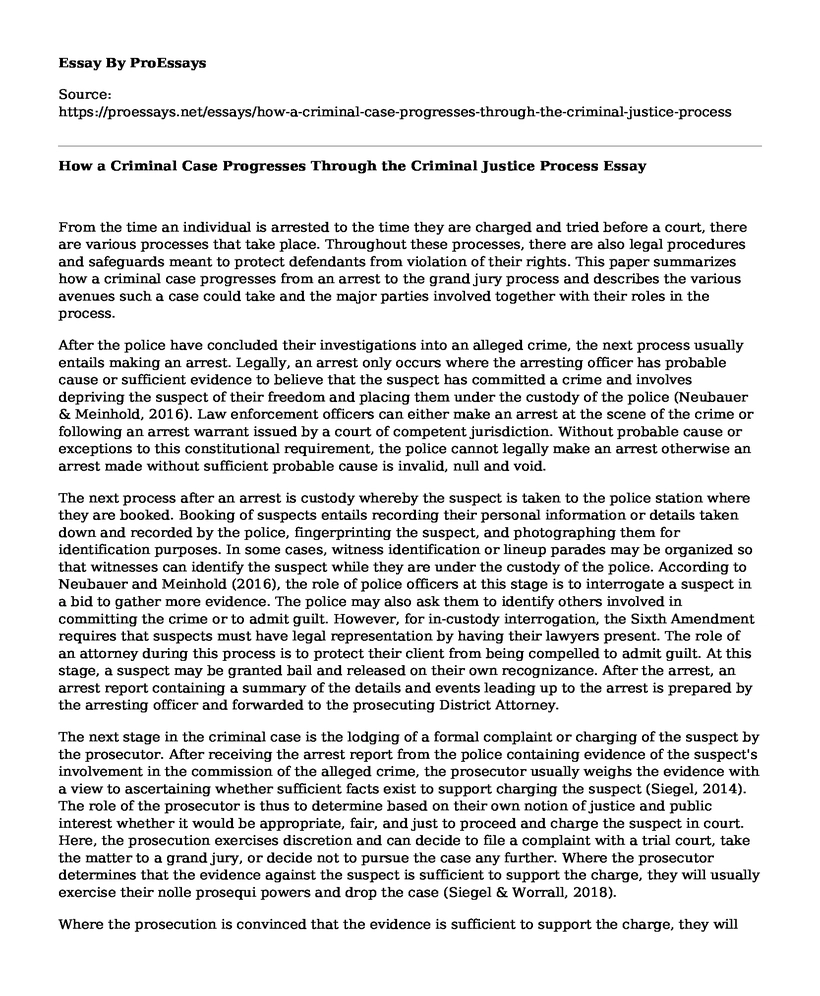From the time an individual is arrested to the time they are charged and tried before a court, there are various processes that take place. Throughout these processes, there are also legal procedures and safeguards meant to protect defendants from violation of their rights. This paper summarizes how a criminal case progresses from an arrest to the grand jury process and describes the various avenues such a case could take and the major parties involved together with their roles in the process.
After the police have concluded their investigations into an alleged crime, the next process usually entails making an arrest. Legally, an arrest only occurs where the arresting officer has probable cause or sufficient evidence to believe that the suspect has committed a crime and involves depriving the suspect of their freedom and placing them under the custody of the police (Neubauer & Meinhold, 2016). Law enforcement officers can either make an arrest at the scene of the crime or following an arrest warrant issued by a court of competent jurisdiction. Without probable cause or exceptions to this constitutional requirement, the police cannot legally make an arrest otherwise an arrest made without sufficient probable cause is invalid, null and void.
The next process after an arrest is custody whereby the suspect is taken to the police station where they are booked. Booking of suspects entails recording their personal information or details taken down and recorded by the police, fingerprinting the suspect, and photographing them for identification purposes. In some cases, witness identification or lineup parades may be organized so that witnesses can identify the suspect while they are under the custody of the police. According to Neubauer and Meinhold (2016), the role of police officers at this stage is to interrogate a suspect in a bid to gather more evidence. The police may also ask them to identify others involved in committing the crime or to admit guilt. However, for in-custody interrogation, the Sixth Amendment requires that suspects must have legal representation by having their lawyers present. The role of an attorney during this process is to protect their client from being compelled to admit guilt. At this stage, a suspect may be granted bail and released on their own recognizance. After the arrest, an arrest report containing a summary of the details and events leading up to the arrest is prepared by the arresting officer and forwarded to the prosecuting District Attorney.
The next stage in the criminal case is the lodging of a formal complaint or charging of the suspect by the prosecutor. After receiving the arrest report from the police containing evidence of the suspect's involvement in the commission of the alleged crime, the prosecutor usually weighs the evidence with a view to ascertaining whether sufficient facts exist to support charging the suspect (Siegel, 2014). The role of the prosecutor is thus to determine based on their own notion of justice and public interest whether it would be appropriate, fair, and just to proceed and charge the suspect in court. Here, the prosecution exercises discretion and can decide to file a complaint with a trial court, take the matter to a grand jury, or decide not to pursue the case any further. Where the prosecutor determines that the evidence against the suspect is sufficient to support the charge, they will usually exercise their nolle prosequi powers and drop the case (Siegel & Worrall, 2018).
Where the prosecution is convinced that the evidence is sufficient to support the charge, they will set the case for a preliminary hearing before a grand jury. According to Siegel and Worrall (2018), the role of the grand jury during the preliminary hearing stage is to determine whether the evidence presented by the prosecutor is sufficient to support the accusation or whether the charges against the suspect are justified. Unlike the regular juries, petit juries do not decide on the suspect's guilt or innocence at this stage but only on the sufficiency of the evidence or the appropriateness of the criminal charges. During this probable cause hearing, the defendant can appear and challenge the prosecution's evidence. According to Siegel (2014), where the grand jury determines that the facts are sufficient to sustain the charge, a true bill of indictment will be issued by them and the suspect prepared for arraignment.
Conclusion
In summary, the main processes involved in a criminal case from arrest to the grand jury hearing include the preparation of an arrest report, custody, filing of a formal complaint, charging, and preliminary hearing. The main parties involved in the process from arrest to grand jury hearings include the police, defense attorneys, the prosecutor, and petit juries.
References
Neubauer, D.W., & Meinhold, S.S. (2016). Trial courts: The preliminary stages of criminal cases. In D.W. Neubauer, & S.S. Meinhold, Judicial process: Law, courts, and politicsin the United States (7th ed., pp. 212-240). Boston, MA: Cengage Learning
Siegel, L.J., & Worrall, J.L. (2018). Essentials of criminal justice. Boston, MA: Cengage Learning, Inc.
Siegel, L.J. (2014). Criminology: The core. Stamford, CT: Cengage Learning.
Cite this page
How a Criminal Case Progresses Through the Criminal Justice Process. (2022, May 17). Retrieved from https://proessays.net/essays/how-a-criminal-case-progresses-through-the-criminal-justice-process
If you are the original author of this essay and no longer wish to have it published on the ProEssays website, please click below to request its removal:
- Essay Sample on Appeals and Post Trials Procedure
- The Family-Based Migration - Paper Example
- Social Justice Paper Example
- Essay Sample on Obama Care: Improving Lives of Millions in Texas
- Stephen's Sex Discrimination Case - Case Study
- Essay Sample on Labelling Theory: Racism & Criminal Justice System
- Book Review Example on The Hot House Life Inside Leavenworth Prison







